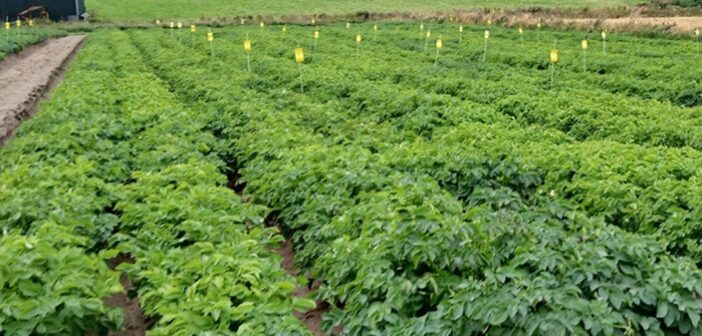A potato trial has shown a significant boost in seed potato tuber numbers through a combination of biological products and agronomic interventions.
Spearheaded by Steven Jack of the Organic Potato Growers and conducted by SAC Consulting with assistance from Lamb Weston and members of the SAC Association of Potato Producers (SACAPP) it is considered a significant development for seed growers aiming to maximise tuber yields.
“Steven Jack outlined a brief that resonated with many regional seed growers in the north of Scotland,” explains trial lead, Kyran Maloney, senior potato consultant at SAC.
“He wanted to test products and techniques to increase tuber numbers on seed crops and with the additional guidance of Agrovista agronomist and North Scotland area manager, Andy Steven, we trialled various treatments related to planting systems and some product applications.”
Potatoes were cultivated in de-stoned beds using a split-plot trail design with quad planting on traditional ridges, allowing more space for root expansion.
Six different approaches were tested on two varieties, Innovator and Ivory Russet:
- Standard agronomy,
- Increased seed rate,
- Physical interventions – including tipping potatoes from one box to another and using black plastic coverings post-planting,
- Calfite Extra applications – a foliar nutrient complex from Unium Bioscience,
- Luxor applications – a biostimulant from Unium Bioscience applied in-furrow and as a foliar nutrient,
- Phosta applications – a soil-applied agent designed to unlock phosphate.
Key findings
The results showed that increasing seed rate had little impact, however, the use of Luxor increased tuber numbers by more than 30%. Similarly, Phosta showed an increase of more than 20%, while tipping and covering techniques boost tuber numbers by over 24%. These statistically significant results are highly relevant for regional growers, notes Kyran.
“Increasing tuber numbers is vital throughout the supply chain, and growers are also exploring ways to enhance sustainability, reduce ‘field generation,’ and lower aphid vectored virus exposure – key factors in maintaining high health status for seed potatoes. Calfite Extra applications also showed an increase of about 13%.
“The trials showed no statistically significant impact on Ivory Russet – this is an interesting result as well, as it’s not easy to explain why interventions worked in one variety and not the other. We’re keen to run similar trials in future seasons to see if we can replicate the result.”
Industry benefits
Commercial varieties are bred for processing, producing fewer tubers, which makes them challenging for seed growers.
“For seed crops, maximising tuber numbers is essential,” said Andrew Cromie of Unium Bioscience.
“Recognising this issue, the trial was designed to assess the impact of two key products – Calfite Extra and Luxor – on seed potato production. These products enhance phosphate availability and provide biostimulants to support tuber formation and overall plant health.
“It’s crucial to identify which varieties respond to biostimulants. In other trials, we have seen significant increases in tuber numbers with Calfite Extra. The interaction of variety and treatments is interesting, and we are keen to explore this further to see if this is consistent year to year.”
Unium Bioscience has also developed LuxiCal, a blend of Luxor and Calfite Extra, and will be exploring potential synergies for boosting tuber numbers.




